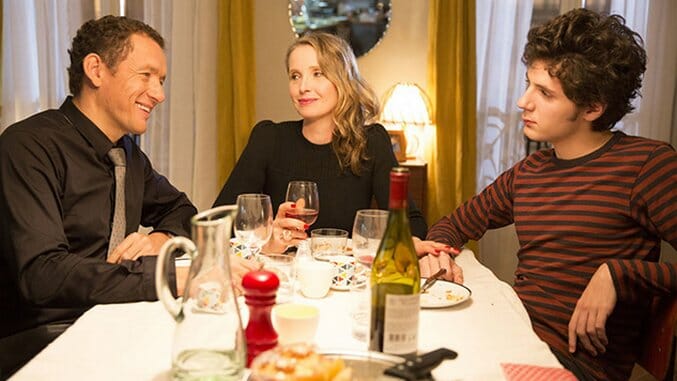
Ever eaten a Wispa, that aerated chocolate confection of British design? No? Well, sit down for Julie Delpy’s Lolo and you’ll get more or less the right idea: sweet and breezy, light to the palette, and yet dotted with quiet high notes that exponentially alter your sensations for the better as you consume it. Lolo, like a tasty candy bar, does not require any heavy lifting to enjoy—though it is subversive in its own way. If the film came from anywhere but France, and perhaps anyone but Delpy, a single glimpse at a poster or at the trailer would set expectations in stone, and in stone they would remain. From the outside, it looks an awful lot like any other inoffensive romantic comedy. Hell, that’s what it looks like from the inside, too.
But looks are often deceiving, so goes the bromide. Just take Lolo’s title character, played by Vincent Lacoste, who first strikes an impression through his unassuming and angelic good looks. Eloi, Lolo to his mother Violette (Delpy), cuts a lamb-y figure, but beneath his harmless veneer lies the soul of an imp. Violette, a fashion industry workaholic returned home from a much-needed spa retreat in Biarritz, has recently found herself a new beau, Jean-René (Dany Boon), an IT nerd who happens to be moving to Paris for a new job. The relationship comes as much a shock to her as to her bestie, Ariane (Karin Viard), and especially to Eloi. Look closely when Violette introduces the two men in her life to one another. If you’ve got a good eye, you can see the gears begin to turn in Eloi’s jealous lizard brain.
Eloi, we quickly learn, wants Violette’s love all to himself, and he will stop at literally nothing short of straight-up murder to send poor, unsuspecting Jean-René packing. No man is good enough for Eloi’s “mommykins,” a nickname he uses for Violette that would be adorable coming from a tyke but sounds downright creepy issuing from the mouth of a nineteen-year-old. His ploy to unburden Violette of Jean-René starts with itching powder, escalates to tranquilizers in champagne, and, well, you’ll have to see the film yourself to see just how crazy Eloi really is. That craziness extends to Delpy by virtue of authorship: Here, she directs and also co-writes with Eugénie Grandval. It takes a certain kind of person to drive their mother’s would-be suitors insane, yes, but it takes a certain kind of mind to will that person into being.
The trick to Lolo is nestled within its sense of tone and craft. Even as Eloi’s assassination attempts on Jean-René’s courtship of Violette grow increasingly jaw-dropping, the film stages them with a shrug and a wink. In an American rom-com, this would come off as nauseatingly coy. In Lolo, it reads as charming, but that charm belies a certain level of unspoken and decidedly maternal terror: Eloi’s obsession with Jean-René, with Violette, and with himself (surprise—he’s kind of a narcissist!) is unchecked and untreated. Movies of Lolo’s make—2010’s Cyrus comes to mind, as well as Monster in Law, which admittedly approaches romantic sabotage from a different angle—tend to build toward a happy catharsis. Lolo doesn’t exactly not do that, but the film’s happy catharsis comes with a keen and surprising edge. It’s a wonder everyone makes it to the credits alive.
Fortunately, Lolo isn’t too dark to bear. It’s great fun, even as, or perhaps especially as, the prank war between Eloi and Jean-René grows far out of bounds. (“Between” is the wrong word. Jean-René has no idea he’s in combat, at least not at first.) The film’s male insecurity is married with its exploration of feminine neuroses, embodied by Violette, an unapologetic worrywart and hypochondriac who exists in a world where everyone but her has to pay mind to social courtesies and ordinances: Leaving the resort town of Biarritz with Ariane, she whips out her smartphone in their train cab, ignoring a fellow passenger’s reminder that smartphone use isn’t allowed. Moments later, that same passenger looks on with muted shock as Ariane and Violette, two grown women, pantomime cunnilingus at one another. Nobody dictates how Violette behaves but Violette. She’s refreshingly nonchalant and endearingly anxious.
Delpy has tried her hand at the rom-com in the past. 2 Days in Paris and 2 Days in New York both lean on culture clash scenarios for mining humor, and Lolo does, too, pitting the “bumpkin” Jean-René against the rigors of urban life in one of the planet’s great metropolises. But she isn’t unkind to Jean-René; she leaves that to Eloi. For all of Violette’s failings and quirks—the round of STD tests she imposes on Jean-René is astronomical—she is made an empathetic character by the amount of pressure placed on her by the demands of her career, by cultural criterions, by her need for love, by her son.
And besides, she looks remarkably well-adjusted compared to the boys once we get to Lolo’s third act. As Jean-René and Eloi come to slapstick blows, you may start to wonder why she doesn’t just pack up her life and whisk herself away from them both. But the insanity is all part of Lolo’s comic philosophy: If itching powder is a timeless gag, then so should be the image of two grown men beating the shit out of each other with umbrellas.
Director: Julie Delpy
Writer: Julie Delpy, Eugénie Grandval
Starring: Julie Delpy, Dany Boon, Vincent Lacoste, Karin Viard
Release Date: March 18, 2016 (NY); March 25, 2016 (LA)
Boston-based critic Andy Crump has been writing online about film since 2009, and has contributed to Paste Magazine since 2013. He also writes for Screen Rant, Movie Mezzanine and Birth.Movies.Death. You can follow him on Twitter and find his collected writing at his personal blog. He is composed of roughly 65% craft beer.